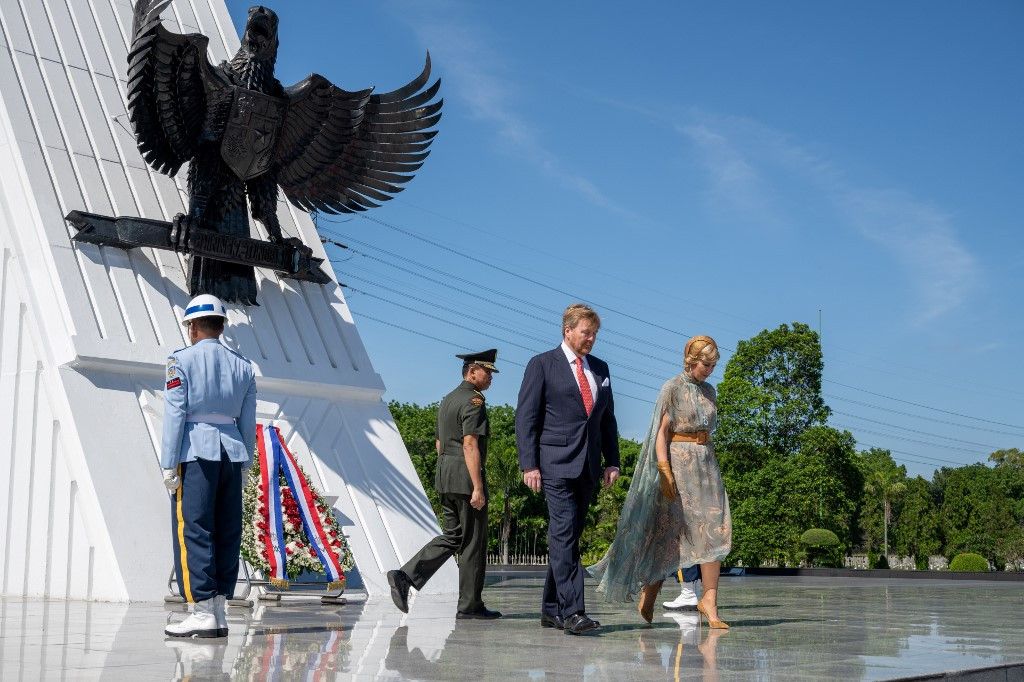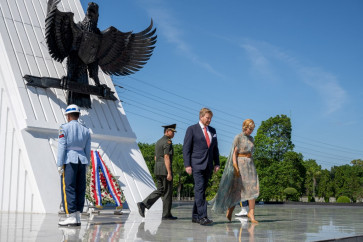Popular Reads
Top Results
Can't find what you're looking for?
View all search resultsPopular Reads
Top Results
Can't find what you're looking for?
View all search resultsThe useless spending of 4.1m euros on the study of ‘extreme violence’
The reason the Dutch state had financed the project: It was some kind of “damage control”.
Change text size
Gift Premium Articles
to Anyone
 Dutch King Willem-Alexander (second right) and Queen Maxima (right) return after laying a wreath during their visit to the Heroes Cemetery in Jakarta on March 10, 2020. - King Willem-Alexander and Queen Maxima of the Netherlands were on a five-day visit to Indonesia, a former Dutch colony. ( AFP/BAY ISMOYO)
Dutch King Willem-Alexander (second right) and Queen Maxima (right) return after laying a wreath during their visit to the Heroes Cemetery in Jakarta on March 10, 2020. - King Willem-Alexander and Queen Maxima of the Netherlands were on a five-day visit to Indonesia, a former Dutch colony. ( AFP/BAY ISMOYO)
F
inally, after four years the Dutch government-sponsored research project Independence, Decolonization, Violence and War in Indonesia, 1945-1950 is finished. From the start I was critical of this project because the 350 years of colonialism were not taken as the starting point.
On Sept. 14, 2017, when the research was publicly presented in Amsterdam, I was invited to take part in a panel discussion. At that time, I had already raised my serious concerns. These concerns were not only mine. Around the same time, I met Indonesian Francisca Pattipilohy and her daughter Dida. Together with Jeffry Pondaag, chair of the Committee of Dutch Honorary Debts (KUKB), Francisca decided to write an open letter to the Dutch government. They sent me their concept letter and with a few others, I helped them improve it.
More people started to join our little “resistance group”. On Oct. 19 that year, via my foundation Histori Bersama, we organized a protest evening at Leiden University. Eventually, 138 individuals and organizations signed the letter.
When I was taking part in the panel discussion, my most important concern was the sidelining of Pondaag, the man whose actions had put the matter of Dutch war crimes on the agenda again. I pointed out that the project was not neutral as the Dutch Institute of Military History (NIMH) was carrying out the research. This institute is part of the Dutch Ministry of Defense and advised the Dutch State in the rejection of Indonesian claims. How in the world could they say that they were independent?
That the research project was far from independent was also proven in the composition of the Advisory Board and the so-called Social Resonance Group. Members from colonial, pro-military organizations, such as the Dutch National Veteran organization, were asked to take part. A high military commander had to advise the researchers about warfare.
This was in stark contrast with the sidelining of Pondaag, whose foundation was the only organization in the Netherlands representing the victims of the violence under investigation. There was no other Indonesian representation either, let alone that of decolonial scholars asked to give advice to the research team.
Along the way, I got the impression that the exclusion of Pondaag was not a coincidence. I became convinced that it had something to do with the reason the Dutch state had financed the project: It was some kind of “damage control”. The state only financed it to feign responsibility for 1945-1949, hoping it would draw away the attention from its historical misbehavior, which the court cases had revealed.


















